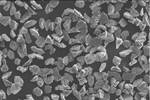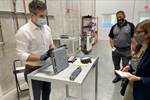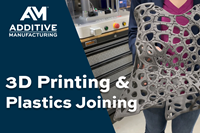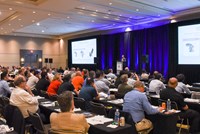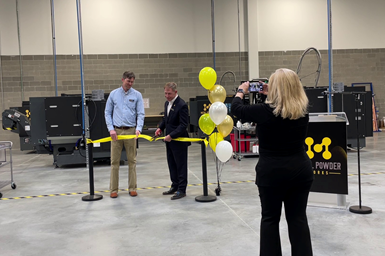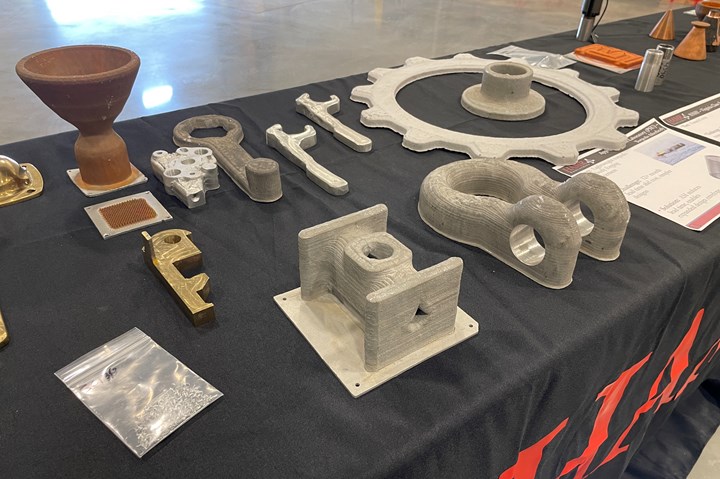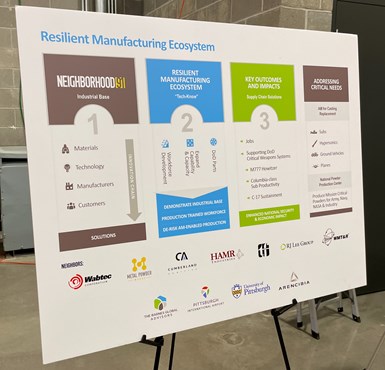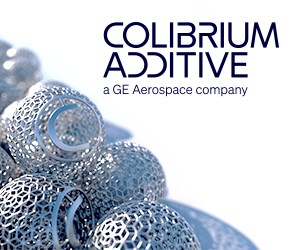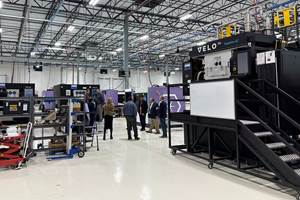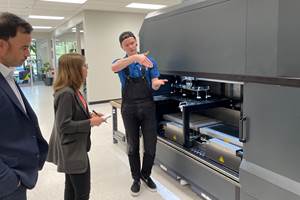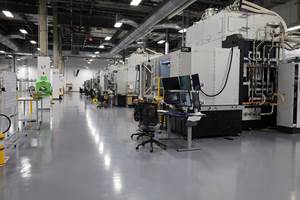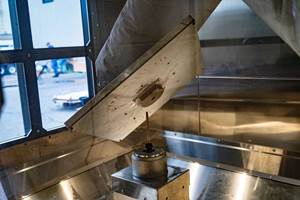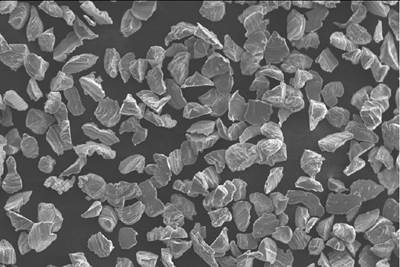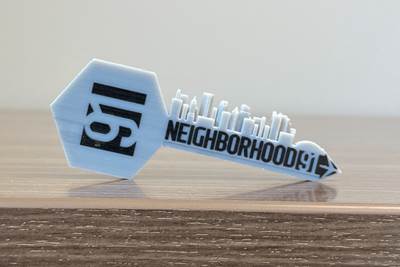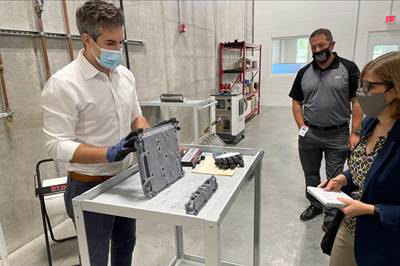Neighborhood 91, the additive manufacturing campus adjacent to the Pittsburgh airport, celebrated the opening of two new tenants on Tuesday, April 18, 2023. Solutions provider HAMR Industries and materials manufacturer Metal Powder Works each welcomed visitors for ribbon cuttings and tours of their facilities, located side-by-side in the first building of the campus. Representatives from other Neighborhood 91 resident tenants Wabtec and Cumberland Additive were on hand for the celebration, showcasing the technical range and collaborative nature of this location.
The Neighborhood 91 concept was developed as an end-to-end additive manufacturing campus, featuring parts producers as well as suppliers, service providers and more all in one location. Key partners in the initiative include The Barnes Global Advisors (TBGA), the University of Pittsburgh, and the Pittsburgh International Airport, which is directly adjacent to the campus. Each “neighbor” brings a unique and complementary set of strengths to the location, and these seeds are beginning to cross-pollinate throughout the site.
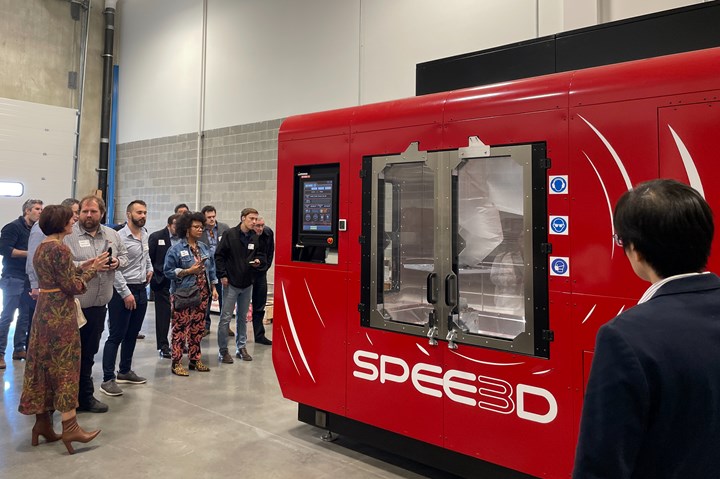
Attendees gather around the Spee3D machine at HAMR Industries. The company uses this cold spray additive technology for repairing and replacing parts. A live demo during the open house used Metal Powder Works copper powder.
New Neighbors Entering Production
For Wabtec and Cumberland Additive, the earliest companies to take up residence, Neighborhood 91 is an extension of existing additive manufacturing capacity.
Wabtec’s N91 facility complements binder jetting and other 3D printing capacity located elsewhere in Pennsylvania, with a particular focus on laser powder bed fusion (LPBF) of aluminum parts.
For Cumberland Additive, which is headquartered in Austin, Texas, the location offered a chance for physical expansion to meet customer demand for lightweight metal parts; aluminum part production through LPBF is currently transitioning to the N91 facility.
The shared focus on aluminum has already paid off for these neighbors, with Cumberland recently stepping in to produce a Wabtec part when the latter’s printer was down for maintenance — illustrating the kind of capacity sharing possible here. Electron beam melting (EBM) capacity for titanium will follow soon through a partnership with JEOL.
“The human and capital resources are huge,” says Mark Straszheim, regional director for Cumberland Additive, of the decision to establish a Pittsburgh-area branch. “Why not locate here?”
Now, the latest companies to join the neighborhood will each use the location as primary manufacturing space, with Metal Powder Works producing powders and HAMR supplying parts.
“This facility is a production facility,” says John Barnes, cofounder of Metal Powder Works, which has six machines for metal powder production on premises. The location is convenient to highway and air transportation, but also local to users. “Our customers are here in this building,” he added; indeed, HAMR was even printing parts with MPW copper powder during the event and Cumberland expects to test materials from the company in the future.
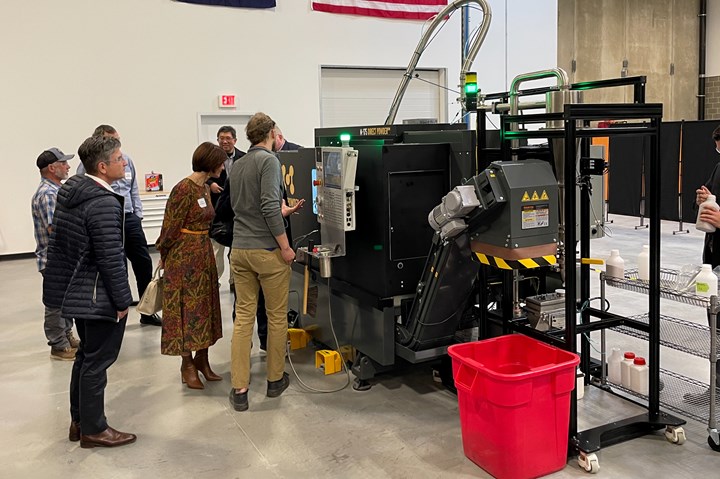
Attendees look on as one of Metal Powder Works’ machines turns copper barstock into powder suitable for 3D printing. The technique opens new material opportunities for AM.
Metal Powder Works, which uses a mechanical process similar to turning to create metal powder from solid feedstock, is focusing initially on the production of copper and high-strength aluminum. Barnes said that its current machine capacity supports production of about 2 kg of material per hour, and that the company expects that figure to rise to 8 kg per hour by the end of the summer.
HAMR, which applies cold spray additive manufacturing by way of a machine from Spee3D, focuses on repair and replacement parts for use in extreme environments. The cold spray technology has the ability to produce metal parts comparable to castings, which can be made faster than most other metal additive systems could produce a part of similar size. That speed is a boon for HAMR, says Michael Schmitt, the company’s CEO and senior research scientist.
HAMR Industries uses cold spray additive manufacturing to produce a range of metal components including parts for defense on short timelines.
“Our goals are to meet the time frames that conventional manufacturing can’t,” Schmitt says, “or to fill gaps where companies are no longer in business or no longer making the needed part.”
Resilient Manufacturing Ecosystem Project Funded
The celebration came on the heels of the announcement that The Barnes Global Advisors (of which John Barnes is also president) has been awarded $1.95 million to develop “a resilient manufacturing ecosystem” for critical parts needs for the Department of Defense (DOD). The group will create workforce development programs using this award at the Neighborhood 91 campus.
The Resilient Manufacturing Ecosystem (RME) will address critical DOD needs such as casting replacements via 3D printing as well as jobs creation and workforce development. (Click to expand.)
Under the initiative, TBGA will work to drive technology and knowledge (“Tech-Know”) into the production campus; transition into a pilot program focused on addressing DOD supply chain issues and upskilling workforce; and create a blueprint for a Resilient Manufacturing Ecosystem (RME) that can be replicated in other locations to support DOD supply chain requirements domestically and abroad.
The award is funded through the DOD Industrial Base Analysis & Sustainment (IBAS) Program’s National Imperative for Industrial Skills (NIIS) initiative and contracted through Texas A&M’s Engineering Experiment Station (TEES) Secure America Institute. Neighborhood 91 residents Wabtec, Cumberland Additive, Metal Powder Works and HAMR Industries are all partners in the project.
Related Content
Zeda AM Production Plant in Ohio Now Open — Thoughts on the New Facility
73,000-square-foot metal powder bed fusion plant includes extensive machining capability plus separate operational models for serving medical versus other businesses.
Read MoreAdditive Manufacturing's Evolving Role at Fathom Now Emphasizing Bridge Production
Bridge production is currently the biggest opportunity for additive manufacturing, says Fathom Manufacturing co-founder Rich Stump. How this service provider leverages AM while finding balance with other production capabilities.
Read MoreVulcanForms Is Forging a New Model for Large-Scale Production (and It's More Than 3D Printing)
The MIT spinout leverages proprietary high-power laser powder bed fusion alongside machining in the context of digitized, cost-effective and “maniacally focused” production.
Read MoreThe Cold Spray Solution to the Casting, Forging Supply Chains
Startup HAMR Industries performs additive manufacturing work at Neighborhood 91 that provides an alternative to traditional casting and forging. Success so far has led to redefining the limits of its additive equipment.
Read MoreRead Next
Affordable 3D Printing Powders Made from Barstock, No Melting Required
DirectPowder, a proprietary technique from Metal Powder Works, transforms solid metal or polymer into 3D printable powder. The solution promises distributed production of both materials and parts, even in the field.
Read MoreWhat Is Neighborhood 91?
With its first building completely occupied, the N91 campus is on its way to becoming an end-to-end ecosystem for production additive manufacturing. Updates from the Pittsburgh initiative.
Read MoreAdditive Manufacturing for Rail Industry Is Gaining Traction at Neighborhood 91
Locomotive manufacturer Wabtec is the first tenant of Pittsburgh’s N91 additive manufacturing ecosystem, where the company is ramping up production via laser powder bed fusion.
Read More

.jpg;width=70;height=70;mode=crop)
